I love to read up on a destination to enrich my travels. I may read non-fiction, classic novels, mystery thrillers. It just depend – on my ability to focus, on the destination, and what books I can get my hands on.
Here are some suggestions to prepare you for adventures in Greece. Or perhaps while you’re in Greece lounging on a chaise or on the sun deck of a boat. Or if you just wish to travel to Greece in your imagination.
Note: PWT participates in the Amazon Services Associates Program, which means that when you buy an item via a link in this document, we get a small percentage of its price. Thank you!
Mythology: Timeless Tales of Gods and Heroes (1942)
by Edith Hamilton
This book is a comprehensive collection of myths and legends from ancient Greece, Rome, as well as Norse mythology.
Hamilton’s retelling of the myths is notable for its simplicity and clarity, making it accessible to readers of all ages and backgrounds. In addition, she presents the tales in a straightforward, chronological order, starting with the world’s creation and ending with the death of Odysseus.
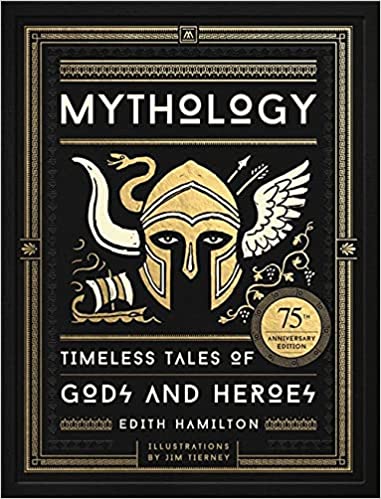
One of the strengths of Mythology is Hamilton’s ability to capture the essence of the myths and convey their enduring relevance to modern readers. In addition, she emphasizes the universal themes and archetypes in the legends, such as the struggle between good and evil, the quest for knowledge and wisdom, and the search for identity and purpose.
Hamilton also provides historical and cultural context for the myths, explaining their significance in ancient Greek and Roman society and highlighting their enduring impact on Western culture. She draws on various sources, including classical literature, art, and archaeology, to provide a rich and nuanced understanding of the myths.
Mythology has been praised for its engaging style, comprehensive scope, and enduring appeal. It has become a classic of mythology and literature.
The Greek Myths (1955)
by Robert Graves
Initially published in two volumes in 1955, the book has become a classic in classical mythology.
Graves’s retelling of Greek myths is notable for its literary style, which combines poetic language with scholarly research making his telling very readable. Graves draws on a wide range of ancient sources, including the works of Homer, Hesiod, and Pausanias, as well as his own interpretations and theories.
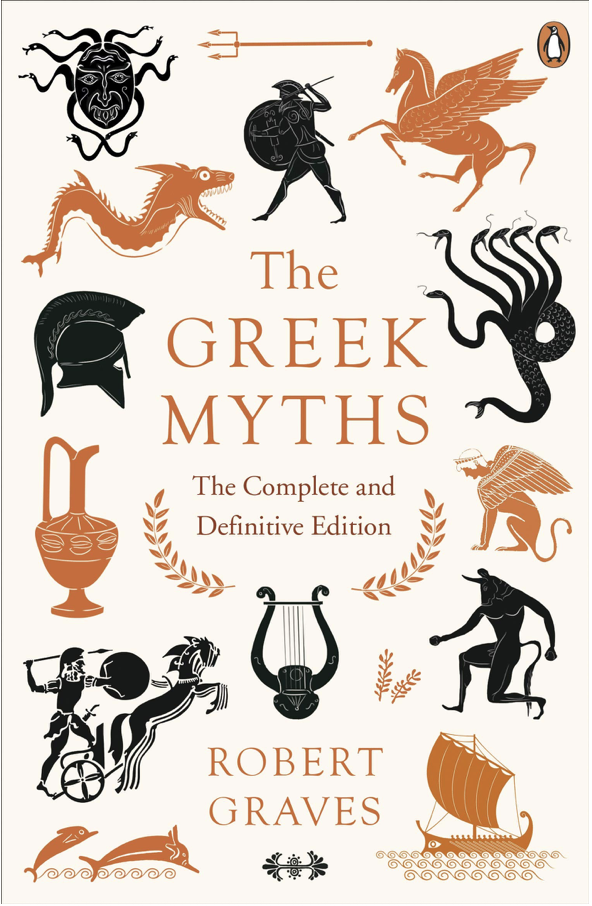
One of the unique features of The Greek Myths is Graves’s use of what he called “iconographic interpretation.” This approach involves analyzing the visual representations of the gods and heroes in ancient art and using them to uncover hidden meanings in the myths themselves. This survey makes the book into an art lesson too.
The Greek Myths covers a wide range of topics, including the world’s creation, the gods’ lives and adventures, and the heroic deeds of mortals such as Heracles and Theseus. The book also explores the cultural and historical context of the myths, providing fascinating insights into ancient Greek religion, politics, and social customs.
Graves’s writing is often praised for its clarity and accessibility, making the book a valuable resource for students of classical mythology and general readers interested in the stories of ancient Greece. However, some scholars have criticized Graves’s theories and interpretations as overly speculative and not based on sufficient evidence.
Overall, The Greek Myths remains a widely-read and influential work in classical mythology, offering a rich and engaging exploration of the stories and legends that continue to fascinate and inspire readers today. I love his poetry and really relished I, Claudius.
D’Aulaires’ Book of Greek Myths (1962)
by Ingri d’Aulaire and Edgar Parin d’Aulaire
This children’s book introduces the mythology of ancient Greece and was written and illustrated by Ingri and Edgar Parin d’Aulaire.
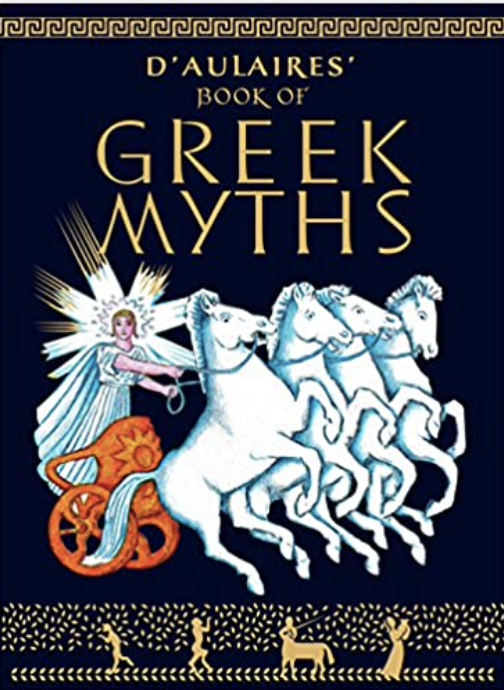
Each story describes a different mythological figure or event. The stories are told simply, engagingly, and are accessible to children and adults alike. Yet they also manage to capture the complexity and depth of the original myths. The d’Aulaires’ illustrations are also an integral part of the book, as they help bring the tales to life with vivid and colorful depictions of ancient Greece’s gods, heroes, and monsters.
One of the strengths of D’Aulaires’ Book of Greek Myths is its ability to convey the moral and cultural values of ancient Greece in an entertaining and educational way. Through the myths, children can learn about concepts such as bravery, loyalty, wisdom, and justice and understand the social and political structures of ancient Greek society.
A classic of children’s literature, critics praise it for its accessibility, its engaging storytelling, and its beautiful illustrations. Often used as a supplement to classroom instruction on Greek mythology, the book has also inspired many adaptations in other media, including films, TV shows, and comic books.
Roumeli: Travels in Northern Greece (1966)
By Patrick Leigh Fermor
Roumeli is not to be found on present-day maps. Instead, it is the name once given to northern Greece—stretching from the Bosporus to the Adriatic and from Macedonia to the Gulf of Corinth, including the mountains and valleys of Epirus and Thessaly.
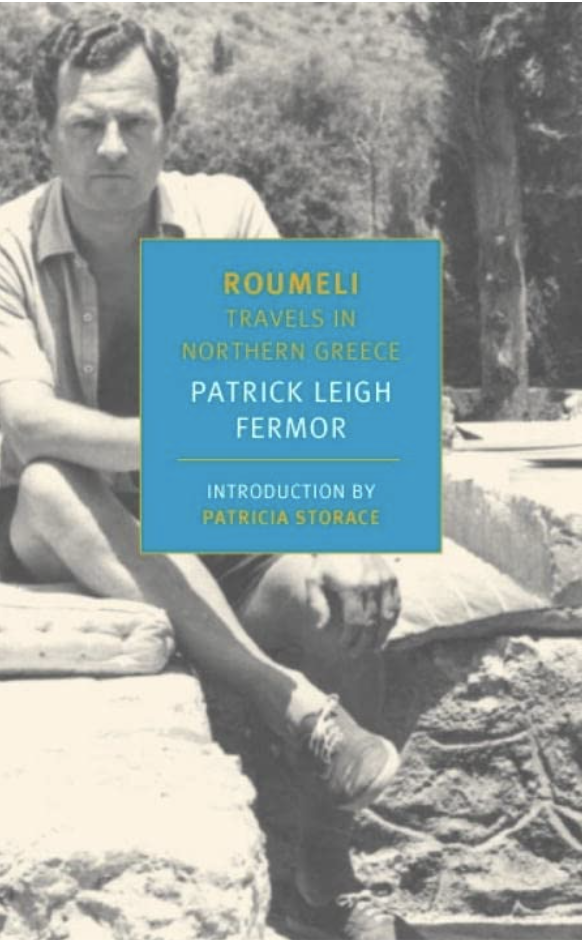
It’s a name that evokes a world where the present binds with the past.
The book is a travelogue of Fermor’s experiences traveling through the region of Roumeli in northern Greece, which includes the mountains and valleys of Epirus and Thessaly.
Fermor is fascinated with the history and culture of Greece. He shares his insights into the local customs, folklore, and mythology of Roumeli. He reflects on his personal experiences and relationships with the people he meets along the way in lyrical language.
“Roumeli” covers a wide range of topics, from the rugged mountain landscapes and ancient ruins of the Pindus range to the lively cities and bustling markets of Thessaloniki and Larissa. Fermor’s writing captures the unique character of each place he visits, from the isolated monasteries of the Meteora to the pastoral villages of Zagori.
One of the strengths of Roumeli is Fermor’s ability to convey the deep sense of history and continuity that pervades the region. He describes how the myths and legends of ancient Greece continue to shape the landscape and culture of Roumeli and how the people of Greece have preserved their traditions and way of life over centuries. He also sheds light on the inherent conflicts of Greek inheritance, from the tenuous links to ancient Greece to its Byzantine heritage to the legacy of Ottoman domination.
Roumeli has been praised for its vivid descriptions, insightful observations, and lyrical prose. It is a must-read for anyone interested in the beauty and complexity of Greece and is considered a classic of travel literature.
Roumeli is a companion volume to Patrick Leigh Fermor’s famous Mani: Travels in the Southern Peloponnese.
The Greek Islands (1978)
By Lawrence Durrell
His Alexandria Quartet is among the very favorite pieces of literature I’ve ever read. His writing is lyrical and poetic, insightful and vivid. And The Greek Islands is now on my “to be read” list.
This travelogue is a memoir of Durrell’s experiences living and traveling on the Greek islands over several years.
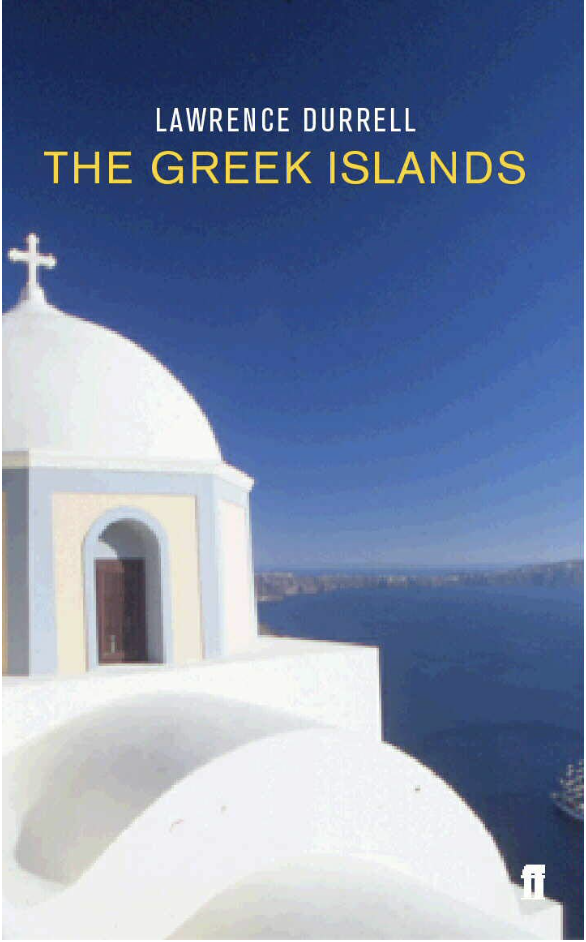
Poetic language and vivid descriptions of the Greek islands’ natural landscapes and cultural traditions characterize Durrell’s writing. He shares his insights into the local customs, history, and mythology of each isle while also reflecting on his own experiences and relationships.
“The Greek Islands” covers a wide range of topics, from the beaches and seaside towns of the Aegean Sea to the rugged mountains and ancient ruins of Crete. Durrell’s writing captures each island’s unique character, from Mykonos’s bustling nightlife to the Cyclades’ quiet fishing villages.
One of the strengths of “The Greek Islands” is Durrell’s ability to convey the sense of timelessness and continuity that pervades the Greek islands. He describes how the ancient myths and legends of the gods and heroes continue to shape the landscape and culture of the islands and how the people of Greece have preserved their traditions and way of life over centuries.
“The Greek Islands” has been praised for its lyrical prose, evocative descriptions, and insightful observations about the culture and history of Greece. It has become a classic of travel literature and is a must-read for anyone interested in the beauty and complexity of the Greek islands.
The Parthenon (2010)
by Mary Beard
This comprehensive study captures the history, architecture, and cultural significance of the Parthenon, the ancient temple on the Acropolis in Athens, Greece.
Beard, a prominent classicist and historian, brings her expertise to bear on the subject, offering insights into the social, political, and religious context of the building of the Parthenon. She also explores the various meanings that the temple has held over the centuries, from a symbol of Athenian democracy to a symbol of Western civilization.
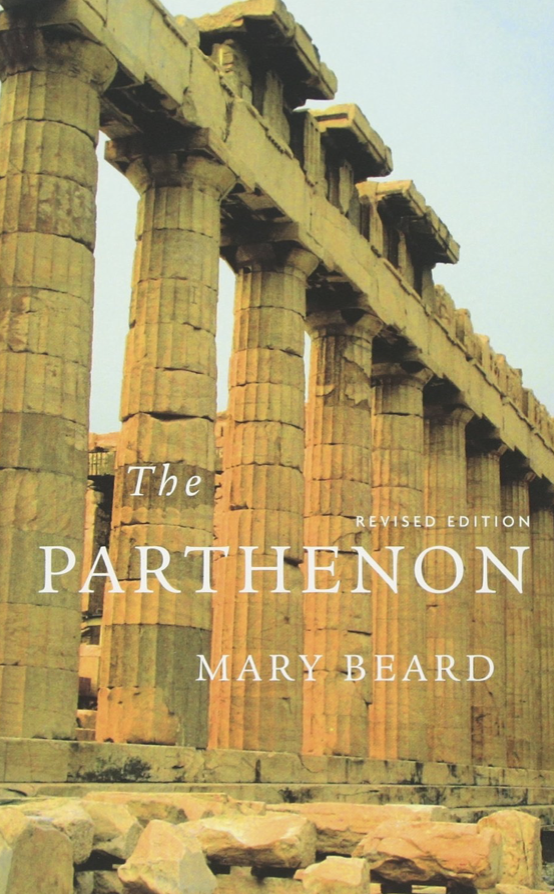
She surveys and relays her information chronologically, beginning with the construction of the Parthenon in the 5th century BCE and continuing through its use as a Christian church, a mosque, and finally as a symbol of Greek national identity in the modern era. Readers learn about the marvelous statue of Athena, made of ivory and gold, the time when the building served as a cathedral called Our Lady of Athens, and even the period when it was deemed the “finest mosque in the world.”
One of the strengths of “The Parthenon” is Beard’s ability to synthesize various sources and perspectives, from ancient texts and archaeological evidence to more recent interpretations and debates. As a result, she offers a nuanced and multifaceted view of the temple and its significance while acknowledging the controversies and disputes surrounding it.
Overall, “The Parthenon” is a fascinating and insightful study of one of the most iconic buildings of the ancient world. Oscar Wilde, Evelyn Waugh, Lord Byron, Sigmund Freud, Virginia Woolfe, and more traveled to see it and wrote of their awe. This book surveys it all, including the Elgin Marbles controversy. Though twenty years old, it’s still a worthwhile read.
Mythos: The Greek Myths Retold (2017)
by Stephen Fry
Written by British actor, comedian, and writer Stephen Fry, this book retells the myths and legends of ancient Greece, from the world’s creation to the heroic deeds of gods and mortals.
Fry is witty and irreverent, which brings a fresh perspective to these timeless stories. He presents the myths in a clear and accessible way while also injecting his humor and insights into the tales.
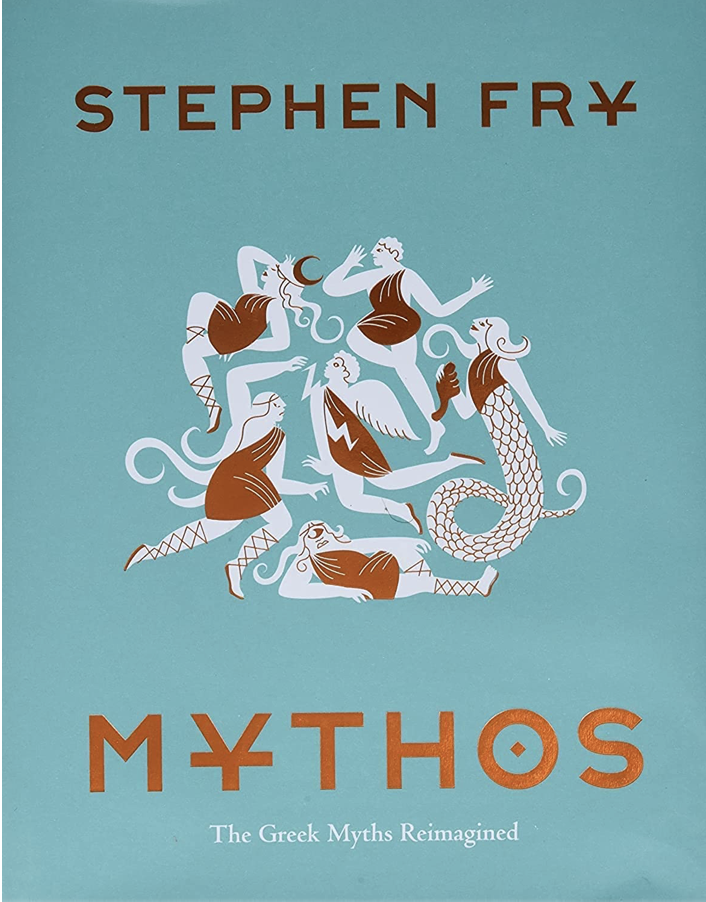
“Mythos” covers a wide range of myths, from the birth of the Olympian gods to the adventures of heroes like Jason and Odysseus. Fry’s writing captures the epic scope and drama of the myths while delving into the psychological and philosophical underlying themes.
One of the strengths of “Mythos” is Fry’s ability to make the myths relevant and engaging for modern readers. In addition, he draws connections between myths and contemporary culture, showing how these ancient stories continue to shape our understanding of the world today.
“Mythos” has been praised for its entertaining and informative style and is a popular choice for readers interested in the myths and legends of ancient Greece.
Stephen Fry has also written a follow-up book called “Heroes: Mortals and Monsters, Quests and Adventures.” This book was published in 2018 and focuses on the stories of the heroes of ancient Greek mythology, such as Heracles, Perseus, and Theseus. “Troy: Our Greatest Story Retold,” published in 2020, retells the story of the Trojan War drawing on a range of sources, from Homer’s “Iliad” to the plays of Euripides, to create a vivid and compelling portrait of one of the most enduring stories of Western civilization.
Stephen Fry is an outstanding narrator if you love to listen to audiobooks.
The Silence of the Girls (2018)
by Pat Barker
This novel retells the story of the Trojan War from the perspective of Briseis, a Trojan queen who becomes a slave to the Greek hero Achilles after he conquers her city.
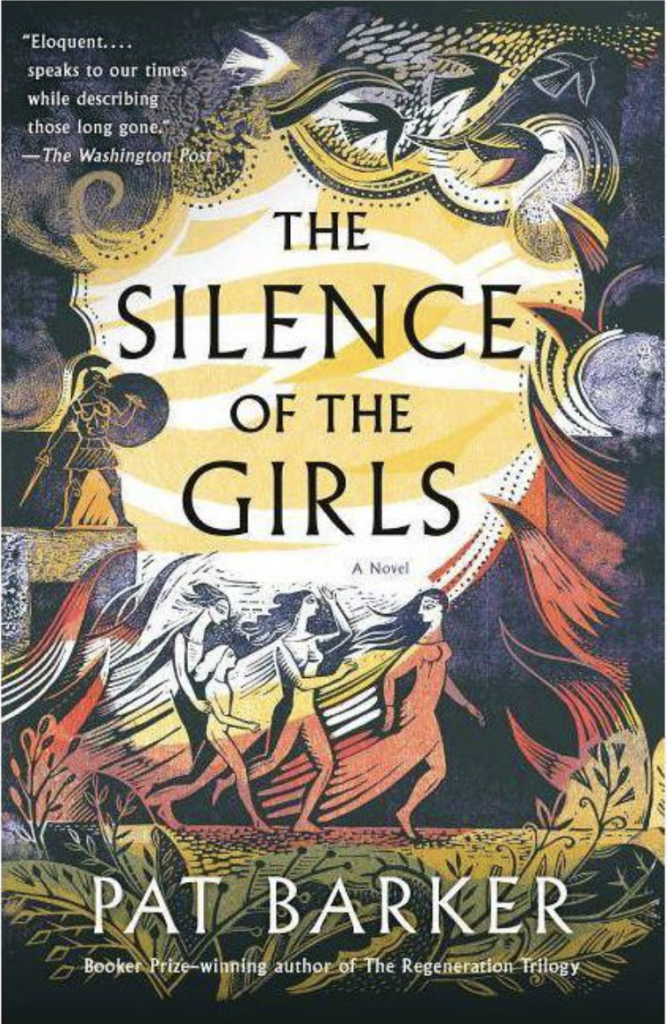
The novel explores themes of power, agency, and gender in ancient Greece, as well as the effects of war on both soldiers and civilians. Through Briseis’s perspective, the novel portrays the brutal realities of war, including violence, sexual assault, and the loss of loved ones.
Barker’s writing style is spare and evocative, conveying war’s emotional and physical trauma with stark realism. The novel also vividly describes ancient Greek society, customs, and beliefs, providing a rich and immersive reading experience.
The Silence of the Girls has been praised for its feminist perspective and its exploration of the role of women in ancient Greek society.
Critics favorably compare this novel to other works of historical fiction, such as Margaret Atwood’s The Penelopiad and Madeline Miller’s The Song of Achilles. I was not too fond of Miller’s The Song of Achilles, but I love Pat Barker’s writing. I find her skill astonishing.
Overall, “The Silence of the Girls” is a powerful and thought-provoking novel that challenges readers to reconsider their understanding of the myths and legends of ancient Greece.
Other notable books include ::
- The Alexandria Quartet by Lawrence Durrell – a tetralogy of novels set in Alexandria, Egypt, and its environs, which includes vivid descriptions of life in Greece and the Greek islands. (These novels are among my all time favorites.)
- The Colossus of Maroussi by Henry Miller – a travelogue and memoir that includes vivid descriptions of Miller’s travels in Greece, including encounters with local people and explorations of ancient ruins.
- My Family and Other Animals by Gerald Durrell – a charming memoir about the author’s childhood on the island of Corfu, where he develops a love of animals and the natural world.
- The Feast of the Goat by Mario Vargas Llosa – a novel set in the Dominican Republic, which includes flashbacks to the time when the dictator Trujillo was assassinated, and some scenes set in Greece.
- The Greek Passion by Nikos Kazantzakis – a novel set in a small Greek village, in which the townspeople reenact the story of the Passion of Christ, with unexpected consequences.
- The Greek Coffin Mystery by Ellery Queen – a classic detective novel set on a Greek island, in which a group of people are stranded by a storm and one of them is murdered.
- The Island by Victoria Hislop – a novel set on the island of Spinalonga, which was used as a leper colony in the early 20th century.
- The Ladies of the Parsonage by M.E. Braddon – a Victorian novel that takes place in Greece, in which a group of Englishwomen travel to Athens and encounter various intrigues and romantic complications.
- The Magus by John Fowles – a psychological thriller set on a remote Greek island, in which a young Englishman becomes embroiled in a complex and mysterious game.
- The Temple of My Familiar by Alice Walker – a novel set in multiple locations, including Greece, that explores themes of family, identity, and spirituality.
Has this post inspired you to dive into the fascinating world of Greek literature and discover the beauty of Greece beyond its stunning landscapes and crystal-clear waters? Why not experience it for yourself on a luxurious trip tailored to your interests and preferences? From exploring ancient ruins to indulging in delicious Greek cuisine, our team of expert travel advisors can create a customized itinerary that will leave you with unforgettable memories. Contact us to start planning your next adventure to Greece! Opa!

